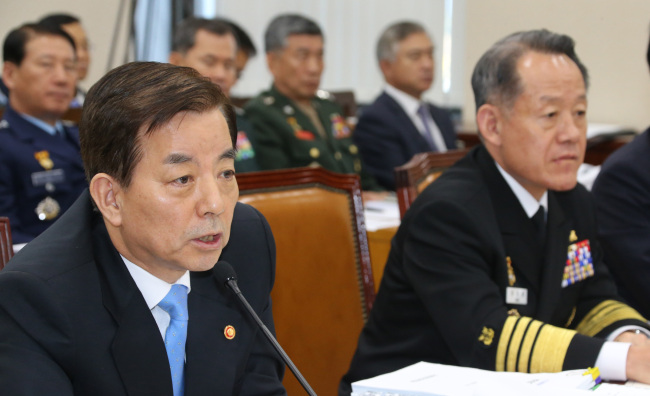South Korea’s Defense Minister Han Min-koo said Monday that North Korea’s technology to miniaturize a nuclear warhead to mount on a ballistic missile is presumed to have reached a “considerable level.”
During a parliamentary audit, Han touched on the issue of Pyongyang’s nuclear weapons capability, which returned to the spotlight last week after U.S. Forces Korea Commander Curtis Scaparrotti said the North was thought to have reached this capability.
“North Korea’s miniaturization capability is thought to be considerable, and it is right for our military to respond to the threat with this in mind,” he said after a lawmaker asked whether the North was able to fit a nuclear warhead on its Scud missiles.
During a parliamentary audit, Han touched on the issue of Pyongyang’s nuclear weapons capability, which returned to the spotlight last week after U.S. Forces Korea Commander Curtis Scaparrotti said the North was thought to have reached this capability.
“North Korea’s miniaturization capability is thought to be considerable, and it is right for our military to respond to the threat with this in mind,” he said after a lawmaker asked whether the North was able to fit a nuclear warhead on its Scud missiles.

The minister also said that the North might be capable of producing a uranium-based nuclear warhead. The North is thought to have facilities capable of producing 40 kg of highly enriched uranium per year, meaning that the North, in theory, could make two HEU warheads every year.
As to the question of whether Pyongyang has developed a multiple-warhead system, Han did not rule out the possibility.
During the audit, Han was also grilled over last week’s agreement between Seoul and Washington to delay the transfer of wartime operational control, previously set for December 2015. He defended the decision, saying that the OPCON transfer was not an issue of military sovereignty.
“I don’t feel ashamed (about the decision). It is to prepare for a possible war through the most effective combined defense system under various current circumstances and security conditions,” the minister said.
After the allies decided to delay the OPCON transfer and pursue a “conditions-based” approach to the transition, criticism surfaced that the decision would further undermine South Korea’s military sovereignty and its efforts to reduce its heavy reliance on the U.S. for security.
“We have a strong will to retake the OPCON. Believing that there must not be any weakness in our national security, we are now pursuing a conditions-based OPCON transfer,” Han said.
With regard to the allies’ agreement to retain their Combined Forces Command and the 210 U.S. Fire Brigade in their current locations, Han said that there was no need for parliamentary consent to readjust the U.S. base relocation projects.
“Under the rules governing the U.S. base relocation projects, the two sides are allowed to make adjustments through mutual agreements,” he said.
U.S. Forces Korea has been carrying out its relocation projects through two major plans: the Yongsan Relocation Plan and the Land Partnership Plan. Through the YRP, the USFK headquarters and the U.N. Command in Seoul will be relocated to Pyeongtaek, while through the LPP, forces from north of Seoul will be consolidated in Pyeongtaek.
By Song Sang-ho (sshluck@heraldcorp.com)
-
Articles by Korea Herald



![[Exclusive] Korean military set to ban iPhones over 'security' concerns](http://res.heraldm.com/phpwas/restmb_idxmake.php?idx=644&simg=/content/image/2024/04/23/20240423050599_0.jpg&u=20240423183955)

![[Graphic News] 77% of young Koreans still financially dependent](http://res.heraldm.com/phpwas/restmb_idxmake.php?idx=644&simg=/content/image/2024/04/22/20240422050762_0.gif&u=)



![[Pressure points] Leggings in public: Fashion statement or social faux pas?](http://res.heraldm.com/phpwas/restmb_idxmake.php?idx=644&simg=/content/image/2024/04/23/20240423050669_0.jpg&u=)










